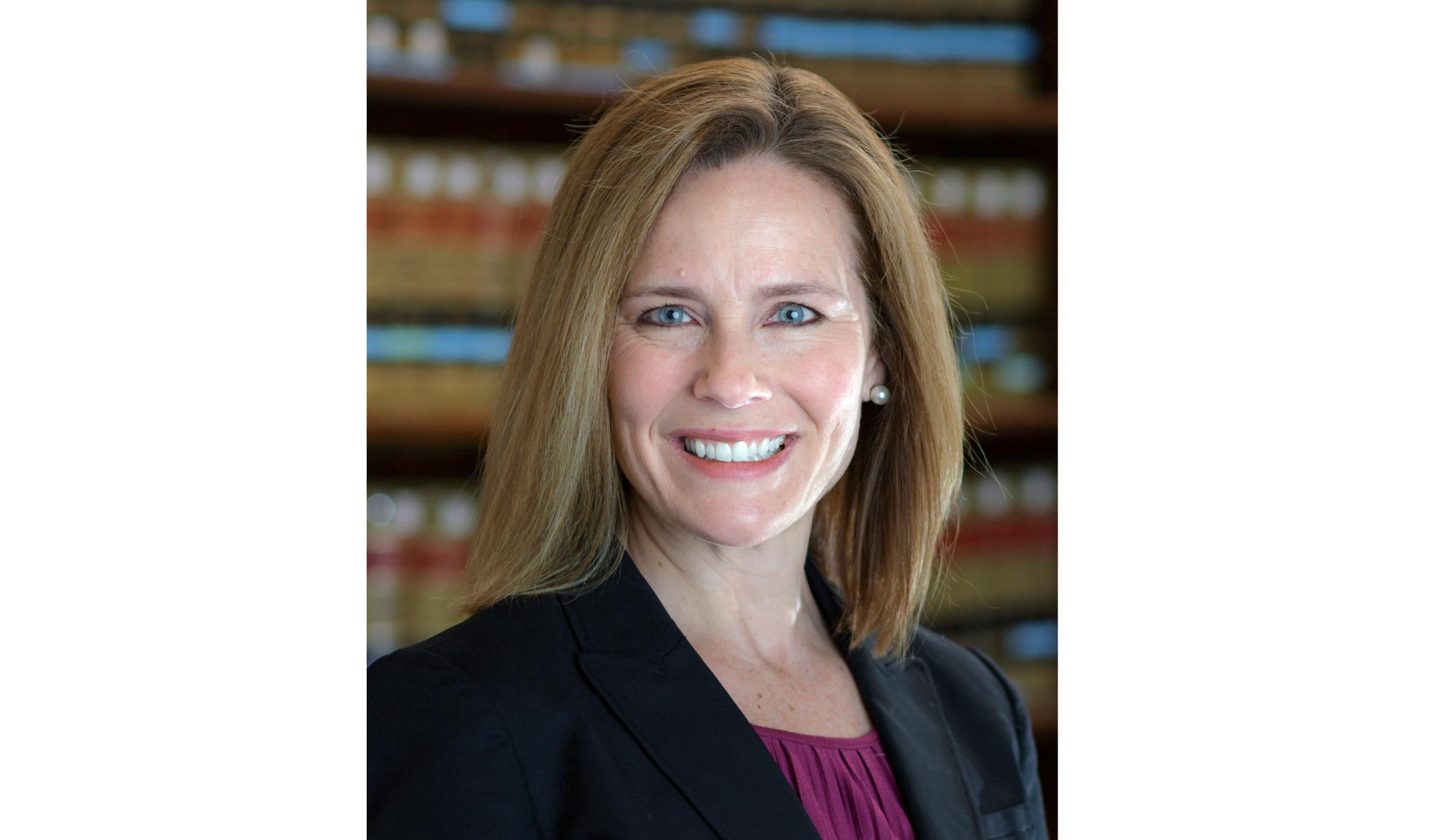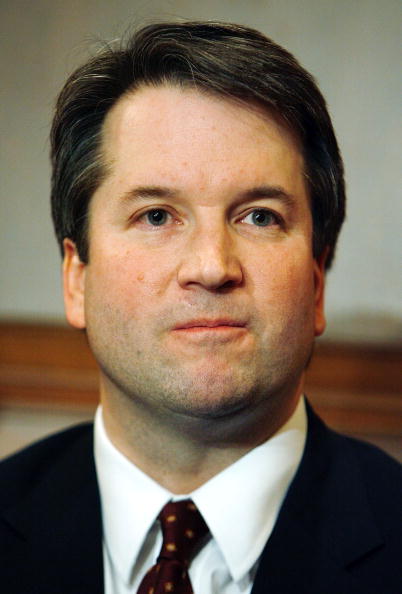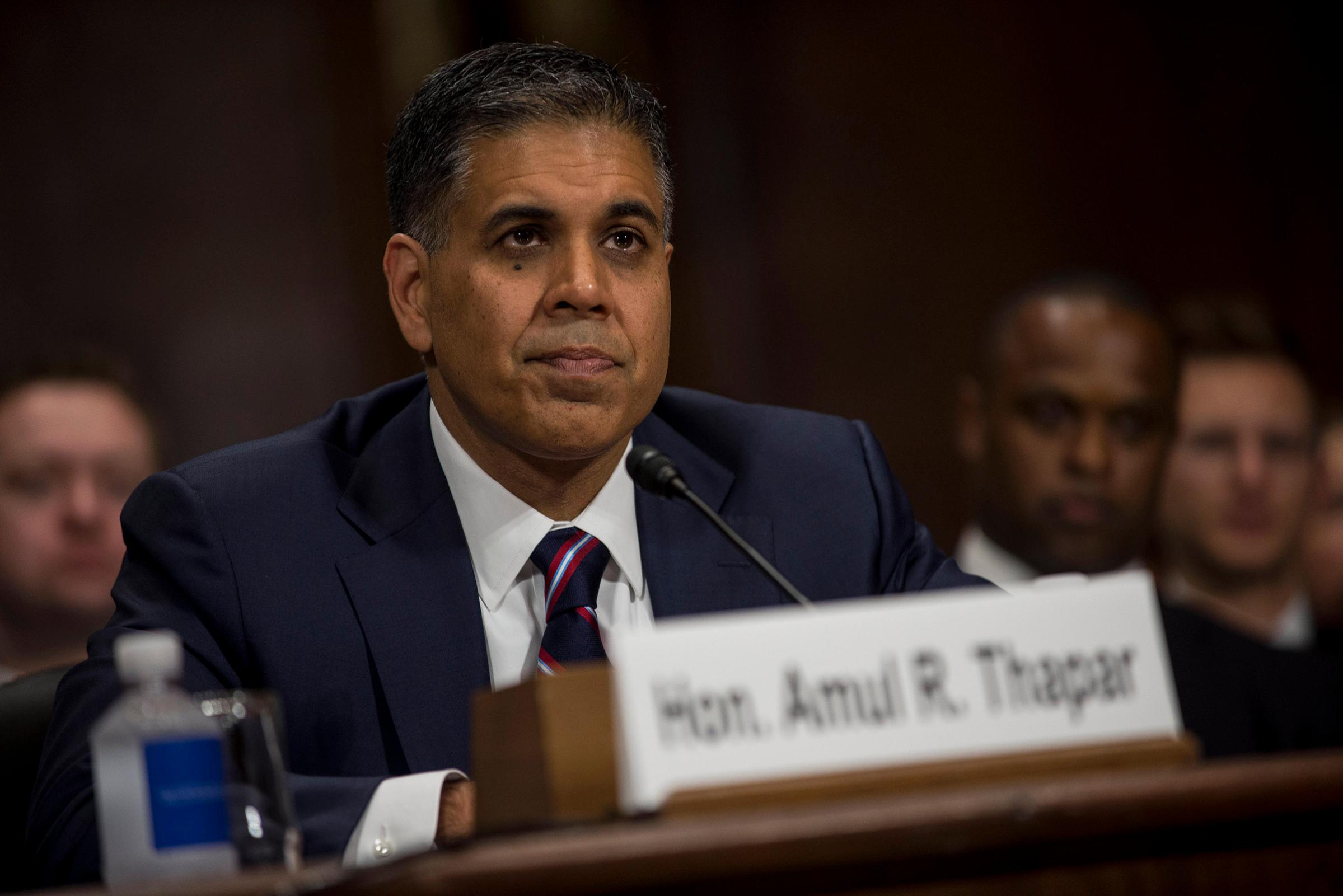Less than a week before President Donald Trump is set to announce his nominee to replace Justice Anthony Kennedy on the U.S. Supreme Court, the names of potential candidates and frontrunners — are emerging.
Trump has interviewed seven candidates so far, starting with four candidate interviews on Monday — Amy Coney Barrett, Brett Kavanaugh, Raymond Kethledge and Amul Thapar — who were each given 45-minute interviews with the President on Monday, according to the Associated Press. Since then, Trump had a phone call with Senator Mike Lee (R-Utah) is also believed to have met with Justice Joan Larsen of the 6th Circuit and Thomas Hardiman of the 3rd Circuit.
White House counsel Don McGahn and outside advisor Leonard Leo, who is on leave from the Federalist Society, have been advising Trump on the decision. Vice President Mike Pence has also reportedly met with some of the candidates.
Trump has indicated that he will nominate someone from a list of 25 people, all of whom were approved by conservative legal organizations. He introduced the first iteration of the list during his 2016 presidential campaign to garner the support of potential Republican voters. Exit polls indicated that the list succeeded, with a majority of Trump voters reporting that Supreme Court appointments were the most important factor in their their voting decision.
Kennedy’s retirement gives Trump the opportunity to reshape the Supreme Court – and the nation – long after his presidency ends. Kennedy was a swing vote on many issues, including abortion and the legalization of gay marriage. Supporters on both sides of the abortion debate have said that Trump’s pick, his second Supreme Court appointee, will be pivotal to the future of abortion rights and Roe v. Wade, the landmark case that legalized abortion nationwide.
Trump said he plans to announce his pick on Monday — part of an accelerated timeline to confirm a justice before the November elections. According to the Associated Press, Trump’s leading contenders at the moment are Coney Barrett, Kavanaugh, and Kethledge.
Below is what we know about these frontrunners in the search process:
Amy Coney Barrett

Amy Coney Barrett, 46, would be the youngest Supreme Court justice on the bench. After graduating magna cum laude from Rhodes College, Coney Barrett attended Notre Dame Law School and became the executive editor of the Notre Dame Law Review. She then clerked for the late Supreme Court Justice Antonin Scalia, a strict constructionist, before becoming a professor at the Notre Dame Law School. In 2017, Coney Barrett was confirmed as Trump’s nominee to serve on the U.S. Court of Appeals for the Seventh Circuit by a Senate vote of 55-43. Three Democratic Senators crossed party lines to vote for her: Joe Donnelly, Tim Kaine, and Joe Manchin. Her confirmation was opposed by 17 women’s rights groups and 27 LGBT groups.
During Coney Barrett’s confirmation hearings, Sen. Dianne Feinstein said, “You have a long history of believing that your religious beliefs should prevail” and “the dogma lives loudly within you.” Other Democrats raised concerns that Coney Barrett’s legal decisions could be influenced by her religious convictions. Coney Barrett told Senators that she is a faithful Catholic, but stated that “it is never appropriate for a judge to impose that judge’s personal convictions, whether they arise from faith or anywhere else, on the law.”
A 1988 scholarly article that Coney Barrett co-wrote argued that judges “cannot — nor should they try to — align our legal system with the Church’s moral teaching whenever the two diverge.” In such circumstances, like cases that involve capital punishment, her article says that Catholic judges should consider recusing themselves. However, she backed down from that position in her confirmation hearing. “I cannot think of any cases or category of cases, including capital cases, in which I would feel obliged to recuse on grounds of conscience if confirmed as a judge on the Seventh Circuit,” she said.
Coney Barrett has publicly expressed her willingness to overturn precedent, which some critics believe would extend to Roe v. Wade. In a 2003 publication, she argued that strict adherence to precedent “on occasion, slides into unconstitutionality.” And, in a 2015 article, she added that only “superprecedents,” the Court’s biggest landmark cases, should be exempt from being overturned. She argued in the article’s footnotes that scholars do not put Roe on the superprecedent list.
Coney Barrett has written extensively about Constitutional originalism, a legal tradition that advocates for an interpretation of the Constitution based on the meaning it would have had at the time it was written. She has also spoken against the Supreme Court’s Miranda decision, which requires police to inform detainees of their right to remain silent and their right to a lawyer. She called it an example of “the court’s choice to overenforce a constitutional norm.”
Brett Kavanaugh

Brett Kavanaugh earned both his undergraduate education and law degree from Yale University. At 53, he is the oldest candidate that Trump has interviewed, though he would still be the second-youngest justice on the Supreme Court if nominated and confirmed. He clerked for Kennedy and reportedly remains close to the justice. Some have speculated that Kavanaugh’s position on Trump’s shortlist made Kennedy more inclined to retire.
Kavanaugh worked for President George W. Bush’s Administration as an Associate Counsel and Staff Secretary. He also participated in Kenneth Starr’s investigation into President Bill Clinton’s affair with Monica Lewinsky. He later wrote that he regretted participating, because he thinks presidents should be exempt from “time-consuming and distracting lawsuits.”
Kavanaugh was tapped by Bush for the D.C. Circuit Court in 2003, but Democrats stalled his appointment for three years, arguing that he was too partisan. Sen. Chuck Schumer said, “Brett Kavanaugh’s nomination… is not just a drop of salt in the partisan wounds, it is the whole shaker.” Kavanaugh disagreed, saying “I firmly disagree with the notion that there are Republican judges and [Democratic] judges. There is one kind of judge. There is an independent judge under our Constitution.” Only four Democrats voted to confirm him.
Kavanaugh has historically applied principles of textualism – judging cases by the strict meaning of the law as-written – and originalism to cases. He’s often concerned with preserving the government’s separation of powers in his decisions. In a variety of cases, he has historically ruled in favor of large business, including telecommunication companies, insurance companies, cable companies, and the auto industry.
In one of his notable decisions, Kavanaugh voted to reject a Washington, D.C. ban on handguns, semi-automatic firearms and automatic firearms. He wrote a dissent based on the logic of Heller v. District of Columbia, stating that courts should assess gun regulations “based on text, history and tradition.” In 2012, he also authored an opinion to uphold a South Carolina voter ID law, which critics argued could disenfranchise voters.
Recently, he also dissented when the D.C. Circuit required the U.S. government to allow an abortion for a 17-year-old illegal immigrant; he blocked the abortion for 10 days until his ruling was overturned. He wrote that his colleagues were creating a “new right for unlawful immigrant minors in U.S. government detention to obtain abortion on demand.”
Raymond Kethledge

Raymond Kethledge, age 51, received both his undergraduate and law degrees at the University of Michigan, where he graduated magna cum laude and second in his law school class. He clerked for Kennedy for a year before practicing at a number of private law firms. In 2006, he was nominated by Bush to the 6th Circuit Court of Appeals. His appointment was stalled for more than a year due to opposition from Michigan’s two Democratic Senators, Carl Levin and Debbie Stabenow. Eventually, the Bush Administration struck a deal to nominate a Democratic state judge in exchange for Kethledge’s confirmation.
During his confirmation hearing, when asked whether he saw the Constitution as a living document or an originalist text, he said “I don’t really have a label.” He also established that “first and foremost, I would follow Supreme Court precedent.”
In one of his most prominent cases, Kethledge argued that credit checks for job applicants were “racially blind.” He wrote an opinion striking down the Equal Employment Opportunity Commission’s attempt to limit private employers’ ability to check the credit history of their job applicants. The EEOC argued that the practice amounted to racial discrimination, but Kethledge accused the agency of employing a similar background check.
In 2017 case, Kethledge authored an opinion against the Obama Administration, denouncing their “continuous resistance” to investigating the IRS’s unfair treatment toward a Tea Party group.
Kethledge has also interpreted the First Amendment to include spending, similar to the controversial 2010 Supreme Court decision Citizens United v. Federal Election Commission. In one ruling he allowed prosecutor candidates to accept campaign contributions from Medicaid providers.
Here are the other candidates that Donald Trump has interviewed over the past week:
Joan Larsen
Joan Larsen, 49, graduated first in her class from the University of Northern Iowa before attending the Northwestern University School of Law. She clerked for Scalia, whom she was particularly close with. Larsen remained in touch with Scalia until his death, was one of only three former clerks chosen to speak at his memorial service and wrote an New York Times op-ed about how much he had influenced her.
After a short stint in private practice, Larsen, a registered Republican, served in the Office of Legal Counsel for a year, providing legal advice to the Bush Administration. For the majority of her professional career, Larsen was a professor at the University of Michigan School of Law. She then spent two years on the Michigan Supreme Court before being nominated by Trump to serve on the 6th Circuit. Her confirmation was held up for months by Michigan’s Democratic Senators, Debbie Stabenow and Gary Peters. Eventually, Larsen was voted in by the full Senate, with Stabenow, Peters, and six other Democrats joining all 52 Republicans to confirm her. Like Coney Barrett, her nomination was opposed by LGBT groups and supported by the pro-life Susan B. Anthony list.
Larsen has an expansive view of executive power. In 2006, she penned an op-ed for the Detroit News defending Bush’s use of signing statements, which are written remarks issued by presidents when they sign bills into law. Larsen disagreed with the American Bar Association’s declaration that signing statements are “contrary to the rule of law and our constitutional separation of powers.” Larsen argued that it is important to give presidents’ a “constitutional voice,” and wrote that a president should enforce a law in the way that aligns with his “independent vision of what the Constitution requires.”
Larsen has also criticized underpinnings of gay rights decisions in the past. She wrote in the Ohio State Law Journal Lawrence v. Texas, a decision that legalized same-sex activity, was “revolutionary.” She commented that they didn’t offer a “thoughtful and thorough justification” for their use of international law as precedent. And, in Mabry v. Mabry, Larsen voted against hearing an appeal by a lesbian mother seeking parental visitation — rejecting a dissent that contained arguments from the landmark gay marriage case, Obergefell. However, in her confirmation hearings, she said that she “absolutely will” follow the precedents of the U.S. Supreme Court.
In a section of her website labeled “Judicial Philosophy,” Larsen said she is a textualist. She wrote that “judges should interpret the laws according to what they say, not according to what the judges wish they would say.”
Amul Thapar

Amal Thapar, 49, graduated from Boston College and the University of California-Berkeley Law School. After a series of clerkships and employment at private firms, Thapar became the District Court Judge for Eastern Kentucky. Last spring, Trump tapped him to serve on the U.S. Court of Appeals for the 6th Circuit. Thapar was the first Indian American judge to serve on the federal judiciary. He was confirmed by the Senate in a 52-44 vote, with all Democrats voting against him. He is reportedly Mitch McConnell’s favorite pick; McConnell called him “absolutely brilliant, with the right temperament.”
Thapar supports textualism, although he acknowledges that it’s “hard.” In a discussion at the University of Virginia Law School, Thapar reportedly said that “it is not the responsibility of the judiciary to amend poor legislative drafting, even if judges would personally prefer a different outcome than what is required by a statute’s text.”
One of Thapar’s most well-known rulings was in United States v. Walli, a case about three anti-nuclear activists who trespassed on, and damaged, federal government property. He sentenced two of the defendants to five years in prison and the third, an 85-year-old nun, to a 35 month prison term. The conviction was later overturned by the 6th Circuit, which sent the case back to a lower court for re-sentencing.
Notably, Thapar believes that minor drug offenses should receive harsh minimum sentences. He reportedly said that the “current sentencing structure does not do enough to punish… repeat offenders.”
In a decision about a same-sex sexual harassment case, Thapar controversially claimed that that the plaintiff had to provide “credible evidence that the harasser was homosexual.” He concluded that the worker didn’t properly show that he was harassed on account of his gender.
Mike Lee
Trump made waves when he spoke with Mike Lee, a Republican Senator for Utah, by phone on Monday about the upcoming Supreme Court nomination.
Lee attended both college and law school Brigham Young University. He clerked for future Supreme Court Justice Samuel Alito, while he was on the 3rd Circuit, before entering private practice. Lee got his start in government while serving as the assistant U.S. attorney for the District of Utah and later as the general counsel for Utah’s governor, Jon Huntsman. In 2010, he defeated incumbent three term Republican Senator Bob Bennett and has served in the Senate ever since. He is also the Chairman of the Senate Republican Steering Committee and a member of the Senate Judiciary Committee.
Lee, 47, is the only candidate on Trump’s shortlist who has never been a judge, and he was a critic of Trump during the 2016 campaign. However, his name has been thrown around by supporters on the right, including Ted Cruz, who called him the “single best choice.” When asked if he would be consider joining the Supreme Court bench, Lee said, “I would not say no.”
As a politician, Lee’s has expressed his views on a number of key issues that the Court may consider in the future. He has called for restrictions on abortion, saying that America should be “rushing” to ban the procedure after 20 weeks and signing an act which prohibited federal funding for abortions. In his 2010 Senate campaign, he said that the power to “protect unborn human life” should be returned to the States.
Lee has also said that Americans have ���a right granted by God and protected by the Constitution” to bear arms. He noted that background checks constitute an invasion of privacy and said that he did not support a ban on assault weapons following the Parkland shooting. Lee has also voted many times against environmental protections. In response to the Supreme Court’s landmark gay marriage decision, he issued a statement that it was “imposing the views of five unelected judges on a country that is still in the midst of making up its mind about marriage. That is unfortunate, but it is not the end of the discussion, as Americans of good faith who believe that marriage is the union of a man and a woman will continue to live as witnesses to that truth.”
In books and speeches about the Constitution, Lee has said he is an originalist. In one speech, he said “I will not vote for a single piece of legislation that I can’t reconcile with the text and the original understanding of the U.S. Constitution.” In an interview after Kennedy’s retirement, Lee noted that judges also have to “take into account the doctrine of stare decisis,” or adhere to precedent.
If Trump nominated him, another Senate seat would open up for re-election. Lee would also have the opportunity to vote himself onto the court — a possibility that he has not ruled out. “My understanding is that that is what Senate rules allow and you’re still a senator until you’re no longer a senator,” he said.
Thomas Hardiman
Thomas Hardiman, 52, was a first-generation student who paid for his education by driving a taxi. He attended Notre Dame on scholarship before graduating from Georgetown Law school. After working for several private law firms, Hardiman became a federal judge in Pittsburgh from 2003-2006. In 2007, he was nominated by George W. Bush to the 3rd Circuit Court of Appeals, where he currently serves. Hardiman’s hearings were uncontroversial, and he was confirmed by a vote of 95-0 with no Democrats opposing him. He is well-liked by Trump’s sister, Maryanne Trump Barry, who also sits on the 3rd Circuit. He was reportedly the runner-up for the Supreme Court opening that went to Gorsuch last year. While living in Washington, Hardiman, a fluent Spanish speaker, has worked with Ayuda, a legal aid clinic that represents poor immigrants in domestic violence and political asylum cases.
When it comes to gun ownership, Hardiman has ruled in favor of an individual-right interpretation of the Second Amendment, believing that the right to bear arms extends to everyone but criminals. He supported federal law barring felons from possessing firearms, but when it comes to law-abiding citizens, he has denounced gun restrictions. In 2013, he wrote that a New Jersey law requiring people to have a “justifiable need” for a handgun was unconstitutional.
Hardiman also allowed a gender-stereotyping case to move forward. He wrote that the plaintiff, a gay man who called himself “effeminate,” was harassed because he “did not conform to” the company’s “vision of how a man should look, speak, and act.” He has ruled against geographical requirements that may have racial impacts, arguing that a fire-department’s residency requirement had a disparate impact on African American firefighters. On occasion, he has also ruled in favor of noncitizens — such as when he supported an asylum applicant who came to the U.S. to avoid gang recruitment.
More Must-Reads from TIME
- Donald Trump Is TIME's 2024 Person of the Year
- Why We Chose Trump as Person of the Year
- Is Intermittent Fasting Good or Bad for You?
- The 100 Must-Read Books of 2024
- The 20 Best Christmas TV Episodes
- Column: If Optimism Feels Ridiculous Now, Try Hope
- The Future of Climate Action Is Trade Policy
- Merle Bombardieri Is Helping People Make the Baby Decision
Contact us at letters@time.com